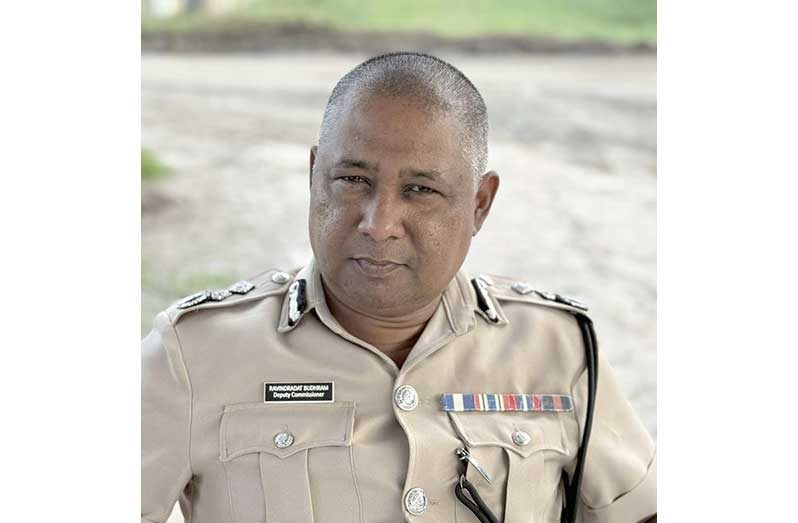– notes modern skills, mindset equipping ranks for 21st century challenges
THE Guyana Police Force (GPF) is undergoing a quiet but far-reaching transformation, and in Episode 6 of Safeguarding Our Nation, Deputy Commissioner of Police, Ravindradat Budhram, pulled back the curtain on what that means for recruits, communities, and the country’s sense of security.
With three decades of service under his belt, from Special Branch to commanding Regions One, Seven, Eight, and Nine, Budhram is no stranger to the Force’s challenges. This week, he made one thing clear: change is not just promised, it’s underway.
MODERN TRAINING FOR A MODERN FORCE
In the early days of his career, training was rigid and narrowly focused. “When I joined 30 years ago, you wouldn’t hear about gender sensitivity or domestic violence in the curriculum,”
Budhram admitted. Today, recruits are exposed to far more than the basics of law enforcement. From computer skills to conflict de-escalation, officers are now prepared for a reality that demands both technical proficiency and emotional intelligence.
What’s more, diversity is no longer a token word. When Budhram signed up, Indigenous representation was almost non-existent. Now, more than 380 Indigenous officers are deployed across interior regions — a move that not only bridges language and cultural gaps but also fosters trust in remote communities.
OPENING DOORS FOR WOMEN AND YOUNG PEOPLE
Women, too, are stepping into roles once closed to them. “There were just a handful of women back then,” Budhram recalled. “Now, they serve in every department, in every role.” And the message to today’s youth is straightforward: if you’re disciplined, capable and willing to serve with integrity, the door is open.
Retention is as important as recruitment. The GPF has been investing in its people through scholarships, legal studies, overseas training and family support. Over 600 officers were trained abroad in areas such as cybercrime, domestic violence investigation and modern policing methods.
Budhram stressed the importance of looking after officers’ families too. From providing quarters for accommodation to scholarships for officers’ children, the aim is to ensure that home life supports work life. “A good family environment means better performance on the job,” he said.
FIGHTING CORRUPTION HEAD-ON
Addressing the elephant in the room, Budhram did not shy away from questions about corruption. “There will always be a few bad elements,” he admitted, citing recent arrests of officers for drug trafficking and illegal firearms. “But the Force has zero tolerance for misconduct. Investigations are thorough and consequences are real.”
Integrity training is now mandatory, and the Office of Professional Responsibility continues to pursue allegations with a firm hand. The message is blunt: if you abuse the badge, you will be held accountable.
What’s changing on the ground? Community relationships. The Force is pivoting from heavy-handed policing to partnership. Officers are now trained to de-escalate conflicts, especially in sensitive situations like domestic violence.
Community Policing Groups — more than 450 of them — and over 85 youth groups nationwide are bringing citizens into crime prevention. “We’re not just patrolling,” Budhram said. “We’re working alongside communities to solve problems together.”
No region is being left behind. The GPF has acquired 19 new patrol boats to reach riverine and interior communities. With more Indigenous officers posted where they live, the old language and access barriers are giving way to local knowledge and trust.
“Policing the interior once meant dealing with isolation and mistrust,” Budhram noted. “Today, our presence is felt in all ten regions, with the same standards and the same commitment to every citizen.”
The episode ended with a reminder that building public trust is slow, patient work — not just about new boats or modern barracks, but about consistent respect and accountability at every level.
Safeguarding Our Nation continues to spotlight these reforms and challenges, giving the public a front-row seat to the transformation of Guyana’s security landscape.



.jpg)









